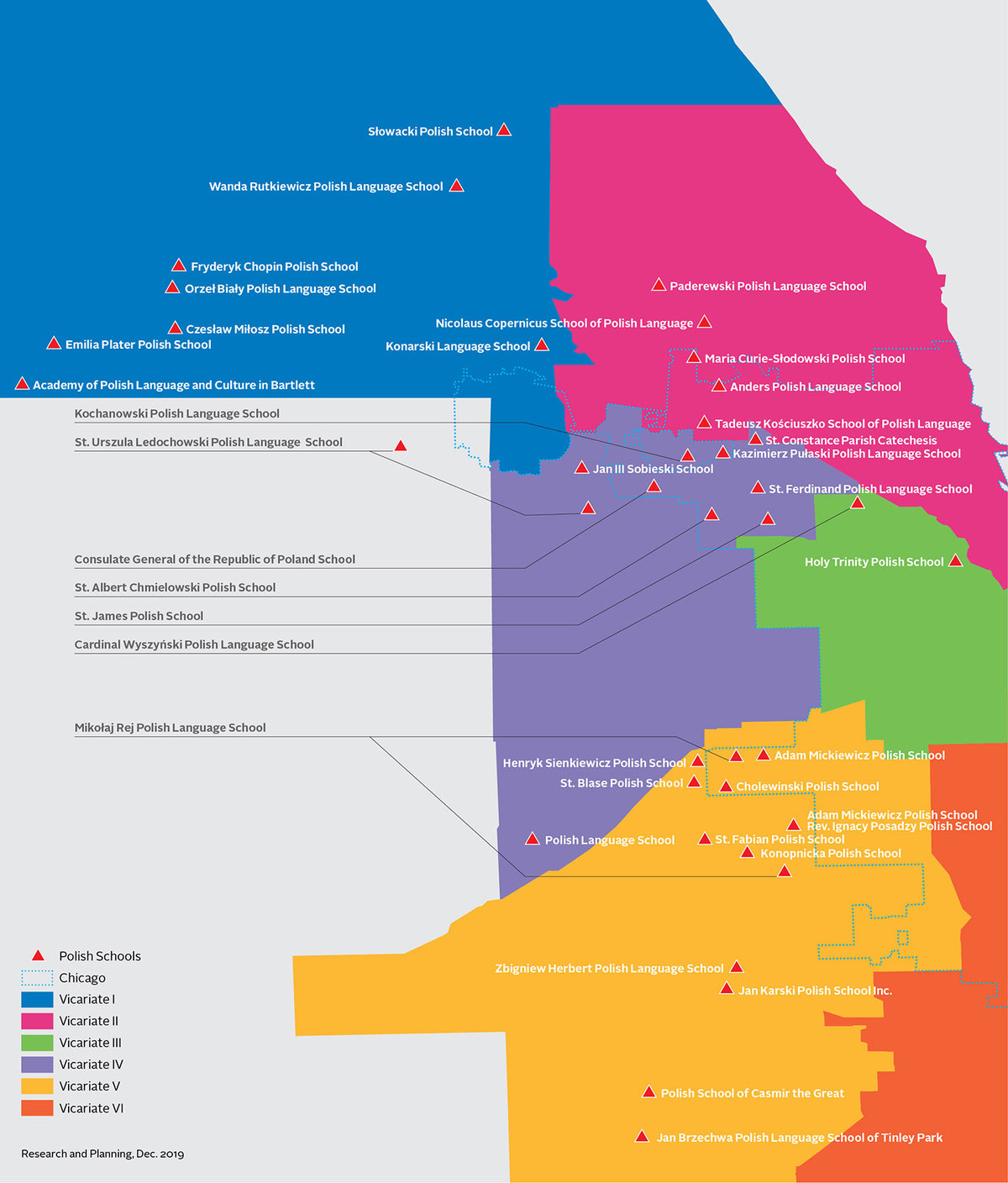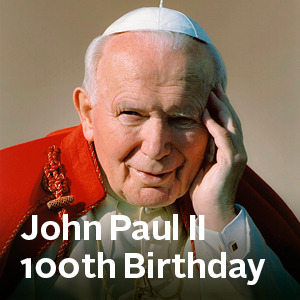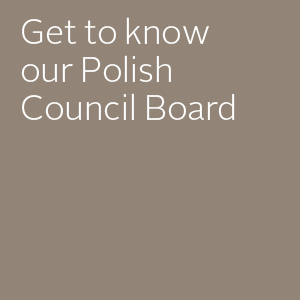Please see below for a map of Polish Catholic schools that offer religious education programs.
Religious Education Curriculum
We recognize parents/guardians as the primary educators of the faith of their children. As we join together in the faith formation of your child, we can only strengthen the Catholic life you lead at home and we support you in this ministry, but we cannot replace you. We seek to share this role of communicating the true teachings of the Catholic faith to your children.
As part of our Catholic commitment, parents and children partner in their pledge to their religious education and spiritual formation by:
- Attending all regularly scheduled class sessions, arriving on time and participating in the entire class time
- Attending Mass on Sundays and Holy Days of Obligation
- Praying together as a family and reviewing the prayers in the textbook
In addition, First Communion students and middle school students (sixth grade – eighth grade) agree to completing all portfolio assignments in preparation for receiving the Sacraments.
Our Programs
First Reconciliation
The First Reconciliation program is available in Polish and is a two-year long course to prepare children for the Sacrament of First Reconciliation beginning in first grade. The Sacrament of First Reconciliation is celebrated in the spring of second or third grade depending on the Polish school program.
First Communion
Communion, or Eucharist, is first and foremost Christ drawing near to us in the grace of sacrament. When we bring our children to the Mass, we affirm our desire for them to grow in faith as Catholics. As they grow older, it is natural for our children to develop a deep and loving relationship with Jesus.
At the Eucharist, we remember the great love of God and Jesus’ saving grace; His life, death and resurrection, which brings us new life. We give thanks for the grace of the sacrament and the promise of full unity with God. At Mass, we offer God gifts of bread and wine. God returns our gifts of bread and wine as Jesus. The Eucharist is truly a remarkable and special gift from our Lord.
Confirmation
The Confirmation program is available in Polish and is a three-year long development to prepare children for the Sacrament of Confirmation beginning in sixth grade. The Sacrament of Confirmation is celebrated when the Bishop is available.
Curriculum Overview
Click here for an overview of religious education curriculum in Polish.
Kindergarten
The goals of the Kindergarten program are to help young children discover their membership in a larger family, the Church. They are introduced to the stories of our traditions in the Bible, the family of the saints and basic prayers. Families are asked to read with their children at home to help reinforce the concepts presented in class. In addition, basic prayers are introduced, including the Angel of God prayer.
First Grade
The goals of the first-grade program are to introduce students to a structured study of their faith. The focus is helping them understand their creation by a loving God, learn the formal prayers of the Church and begin a life of prayer, and understand their membership in the Church.
By the end of first year, students will be expected to know the Sign of the Cross, Our Father, Hail Mary and Glory Be.
Second Grade
The second-grade curriculum focuses on preparing the students for the Sacraments of Reconciliation and the Eucharist. In the course of this preparation, they concentrate on the life of Jesus, how the Church celebrates the Sacraments in its liturgy, and how they can draw closer to God in prayer and in the Sacraments. In addition to their text, First Communion candidates use a supplemental book in the classroom and home with their families.
By the end of second grade, students will be expected to know an Act of Contrition, the basic responses for the mass, and a prayer to say after receiving communion.
Third Grade
The third-grade curriculum concentrates on what it means to belong to the church. Themes taught in first and second grade are repeated in greater depth as the students are growing in their understanding. They specifically explore how the church functions, what the Church believes in the Creed, and how the Church depends upon Scripture. In addition, they will be able to pray the Rosary independently.
By the end of third-grade, students will be expected to know the Apostles’ Creed, the prayers and structure of the Rosary, and be able to describe basic personnel (priest, bishop, etc.) and basic structures (parish, Vatican, etc.) in the Church.
Fourth Grade
The fourth-grade curriculum is the foundation for morality in the Commandments and Beatitudes. Students will learn how our moral tradition is rooted in the Old and New Testaments, what the church teaches about how we should live our lives, and explore ways that they can “do good and avoid evil” in their everyday lives.
By the end of fourth-grade, students will be able to list the Ten Commandments, the Beatitudes, the Precepts of the Church, the Corporal and Spiritual works of Mercy, and the Theological and Cardinal virtues.
Fifth Grade
The fifth-grade curriculum focuses on the sacraments and liturgy of the Church. In addition, they will explore Scripture further. Students will learn about each of the sacraments in more depth, have a working familiarity with the liturgy and the liturgical year, and explore the life and message of Jesus through the study of the Gospel of Mark.
By the end of fifth-grade, students will be able to list, describe and define each sacrament, list the basic parts of Mass, describe the principal actions in the liturgy, and define the major seasons of the Church year and the Holy Days of Obligation. They will also be able to recite the Nicene Creed.
Sixth Grade
Sixth-grade covers the Old Testament. Students will develop a working knowledge of the major themes of the Old Testament, explore more about Judaism and the world of the Scriptures, and describe the links between the Old Testament and Christian tradition by reading the Gospel of Matthew.
By the end of sixth-grade, students will be able to identify and describe the major events in the Old Testament and the major events in life, death and resurrection of Jesus Christ in chronological order.
Seventh Grade
Seventh-grade consists of the teachings of Jesus and moral decision-making. Students read the Gospel of Luke which will help lay the foundation for discussion about living a moral life and pose the challenge of discipleship.
Eighth Grade
The eight-grade curriculum consists of studying the Creed, the Acts of the Apostles and life in the church, a review of Catholic teaching and immediate preparation for Confirmation. The review of the Creed and what the church believes, provides a foundation to profess that belief in the sacrament of Confirmation. The year focuses on the ways that the Christian life is lived out by those who are fully initiated Christians.
| Grade | Major Theme | Additional Notes/Resources |
| K | Through Baptism, we belong to a larger family, the Church | Belonging to God’s family/listening to God’s Word/Angels |
| 1st | God is the Creator of the Universe; One God, three Divine Persons | Genesis/Luke |
| 2nd | Life of Jesus; Celebration of Reconciliation and Eucharist | First Reconciliation and First Communion |
| 3rd | In depth study of the Church. Scripture, structure and teachings of Jesus | Apostles’ Creed |
| 4th | Morality | 10 Commandments and Beatitudes |
| 5th | In depth study of the Sacraments and Liturgy | Sacraments/Gospel of Mark |
| 6th | Hebrew Scriptures, covenants and salvation history | Old Testament/Gospel of Matthew; Confirmation Preparation |
| 7th | Life and teachings of Jesus as the fulfillment of the Old Testament promises and moral decision making | Gospel of Luke/Confirmation Preparation |
| 8th | The Church | Acts of the Apostles/New Testament Letters, Confirmation Preperation |



